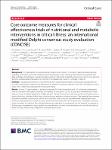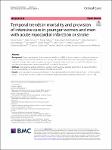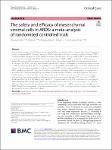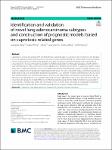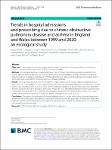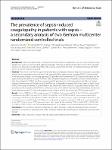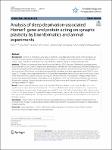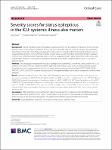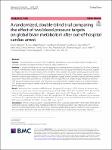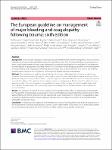Search
Author
- Daqing, Ma (3)
- Alexis, Ferré (2)
- Anna, Lybeck (2)
- Ashish K., Khanna (2)
- next >
Subject
- intensive care unit (8)
- acute respiratory dist... (5)
- chronic obstructive pu... (5)
- ICU (5)
- next >
Has File(s)
Search Results
Clinical research on nutritional and metabolic interventions in critically ill patients is heterogenous regarding time points, outcomes and measurement instruments used, impeding intervention development and data syntheses, and ultimately worsening clinical outcomes. We aimed to identify and develop a set of core outcome domains and associated measurement instruments to include in all research in critically ill patients. |
Timely management of acute myocardial infarction (AMI) and acute stroke has undergone impressive progress during the last decade. However, it is currently unknown whether both sexes have profited equally from improved strategies. We sought to analyze sex-specific temporal trends in intensive care unit (ICU) admission and mortality in younger patients presenting with AMI or stroke in Switzerland. |
Mesenchymal stromal cells (MSC) have shown potential efficacy in both animal and human trials of acute respiratory distress syndrome (ARDS). Especially during the COVID-19 pandemic, MSC was intensely studied for treating COVID-19-induced ARDS. The purpose of this study is to evaluate the safety and efficacy of MSC in ARDS via a meta-analysis of randomized controlled trials (RCTs). Therefore, a meta-analysis of RCTs of MSC as a therapy for ARDS was conducted. The protocol of this review was registered on Open Science Framework. With no language restriction and according to the “PICOs” principle, searches were conducted on Pubmed and Embase to retrieve any clinical literature on MSC for ARDS. Any RCT, which compared MSC to controls for ARDS, where MSC and controls were intravenously i... |
Postoperative death is the third leading cause of death in the world, but the quality of death after surgery has been poorly documented. This study aimed to evaluate the feasibility of a questionnaire survey for the bereaved family regarding the postoperative quality of death and the impact of preoperative functional disability on the quality of death. |
To investigate the trends in hospital admissions and medication prescriptions related to asthma and chronic obstructive pulmonary disease (COPD) in England and Wales. |
Sepsis and septic shock are frequently accompanied by coagulopathy. Since the sepsis-induced coagulopathy (SIC) score was first described, subsequent studies from Asia revealed a SIC prevalence of 40–60%. In Europe, however, SIC prevalence in patients fulfilling sepsis criteria according to the third international consensus definition (SEPSIS-3) has not yet been evaluated. |
Sleep plays an important role in people's physical and mental health [1]. Good sleep can not only effectively enhance the brain's ability to remove harmful substances, but also help maintain brain function [2], including mental health, supporting learning and memory, and regulating synaptic plasticity, in the process of which genes involved in sleep, especially those expressions with the circadian rhythm in brain, are crucial regulators [3]. Recent research evidence has shown circadian regulation of sleep-dependent gene expression produces short-term or even long-term changes in brain behavior and function [4]. Conversely, sleep deprivation (SD) may damage the brain by disrupting gene expression related to the sleep–wake cycle of synaptic proteins [3, 5]. SD can affect gene expressi... |
Current prognostic scores for status epilepticus (SE) may not be adequate for patients in ICU who usually have more severe systemic conditions or more refractory episodes of SE. We aimed to compare the prognostic performance of two SE scores, Status Epilepticus Severity Score (STESS) and Epidemiology-Based Mortality Score in Status Epilepticus (EMSE) score, with four systemic severity scores, Acute Physiology and Chronic Health Evaluation 2 (APACHE-2), Simplified Acute Physiology Score 2 (SAPS-2), Sequential Organ Failure Assessment (SOFA) score, and Inflammation, Nutrition, Consciousness, Neurologic function and Systemic condition (INCNS) score in critically ill patients with SE. |
This study aimed to assess the effect of different blood pressure levels on global cerebral metabolism in comatose patients resuscitated from out-of-hospital cardiac arrest (OHCA). |
Severe trauma represents a major global public health burden and the management of post-traumatic bleeding continues to challenge healthcare systems around the world. Post-traumatic bleeding and associated traumatic coagulopathy remain leading causes of potentially preventable multiorgan failure and death if not diagnosed and managed in an appropriate and timely manner. This sixth edition of the European guideline on the management of major bleeding and coagulopathy following traumatic injury aims to advise clinicians who care for the bleeding trauma patient during the initial diagnostic and therapeutic phases of patient management. |

